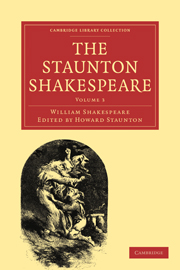CORIOLANUS
Published online by Cambridge University Press: 29 August 2010
Summary
“The Tragedy of Coriolanus” appears to have been first printed in the folio of 1623. In the same year, November 8th, it was entered on the Registers of the Stationers' Company by Blount and Jaggard, the publishers of the folio, as one of the copies “not formerly entered to other men.” Malone ascribes it to the year 1610; but with the exception of some peculiarities in the style, which would lead us to class it among the poet's latest plays, there is not a particle of evidence, internal or extrinsic, to assist in determining within several years the date of its production. That it was written subsequently to the publication of Camden's “Remains” in 1605 is probable, from the resemblance between the following version of the famous apologue of the members' rebellion against the belly, as told by that author, and the same story in the speech of Menenius, Act I. Sc. 1; for, as Malone remarks, although Shakespeare found this fable in North's Plutarch, there are seme expressions, as well as the enumeration of the functions performed by the respective instruments of the body, which he seems to have taken from Camden:—
“All the members of the body conspired against the stomach, as against the swallowing gulfe of all their labours; for whereas the eies beheld, the eares heard, the handes laboured, the fecte travelled, the tongue spake, and all partes performed their functions; onely the stomache lay ydle and consumed all.
- Type
- Chapter
- Information
- The Staunton Shakespeare , pp. 123 - 192Publisher: Cambridge University PressPrint publication year: 2009First published in: 1860

